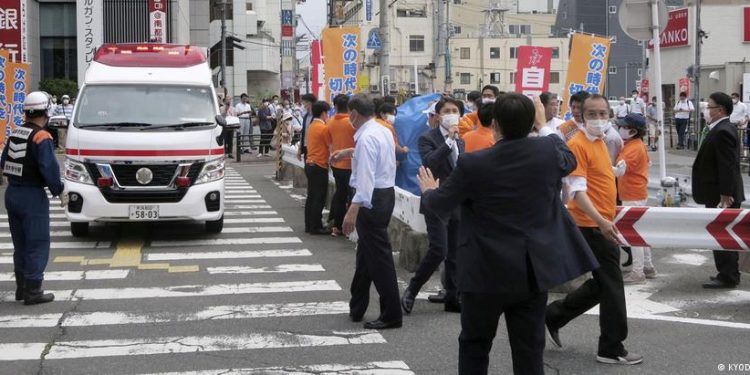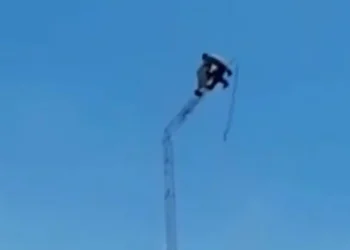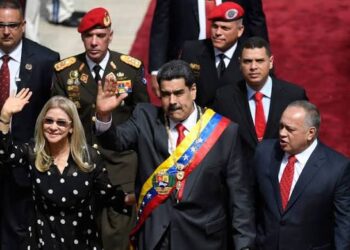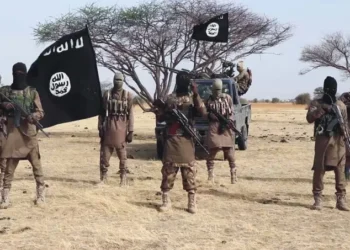Japan’s former Prime Minister Shinzo Abe is in hospital suffering cardiac arrest after being shot during a campaign speech. Authorities have arrested a male suspect.
Japan’s Prime Minister Fumio Kishida said his predecessor Shinzo Abe is in a “very grave condition” after being shot on Friday during a campaign event in western Japan.
“I pray that former prime minister Abe will survive,” Kishida said.
Earlier Chief Cabinet Secretary Hirokazu Matsuno confirmed the shooting and said that one man has been taken into custody.
Police said a 41-year-old man had been arrested. Local media reported the suspect had served in the navy and left Japan’s Self-Defense Force in 2005. According to NHK, the suspect confessed to the police that he was unhappy with Abe and intended to kill him.
The attack has shocked a nation with some of the world’s strictest gun control laws. Public broadcaster NHK reported that the shooter used a homemade gun.
Journalist Sonja Blascke in Tokyo told DW that lots of people have “condemned the violence as the country is not used to events like this… The question is how the attacker could get past security.”
What we know so far
An NHK reporter on the scene said they could hear two consecutive bangs during Abe’s speech. Media reports said Abe was shot from behind and hit in the neck and chest area.
Abe, 67, collapsed and was bleeding from the neck, a source from his ruling Liberal Democratic Party (LDP) said.
NHK footage showed Abe collapsed on the street, surrounded by several security guards. He was holding his chest with his shirt smeared with blood.
“He was giving a speech and a man came from behind,” a woman at the scene told NHK.
“The first shot sounded like a toy. He didn’t fall and there was a large bang. The second shot was more visible, you could see the spark and smoke,” she added.
NHK and Kyodo both reported Abe was taken to the hospital and appeared to be in cardo-respiratory arrest. It was not immediately clear how serious his injuries were or if he was still displaying vital signs.
Election campaigning on hold
A government spokesperson said Prime Minister Kishida had suspended his election campaign following the news of the shooting. He and his Cabinet ministers are returning to Tokyo.
Kishida called the shooting “unforgivable.” He said Japan could not accept that this violent act took place during an election.
“It is a barbaric act during election campaigning, which is the foundation of democracy, and it is absolutely unforgivable. I condemn this act in the strongest terms,” he said.
His government has reportedly set up a crisis team.
Japan is due to hold elections for its upper house of parliament on Sunday, with the LDP projected to win convincingly.
Reactions from around the world
US Secretary of State Antony Blinken said that US was “deeply concerned” by the shooting, while Rahm Emanuel, US Ambassador to Japan, called Abe “an outstanding leader of Japan and unwavering ally of the United States.”
British Prime Minister Boris Johnson said he was “appalled and saddened” by the “despicable’ attack.”
India’s PM Narendra Modi tweeted he was ‘deeply distressed’ by the attack, while the Russian Ambassador to Japan, Mikhail Galuzin, strongly condemned “the barbaric attempt” on Abe’s life.
Australian Prime Minister Anthony Albanese tweeted “our thoughts are with his family and the people of Japan at this time.”
Taiwan leader, Tsai Ing-wen, called Abe “a staunch friend of Taiwan’s.”
“He has supported Taiwan for many years and spared no effort to promote the progress of Taiwan-Japan relations,” she said in Facebook post.
Who is Shinzo Abe?
Abe, a grandson of former Prime Minister Nobusuke Kishi, was Japan’s longest-serving premier.
He was in office for a year in 2006 and then from 2012 to 2020.
Abe was 52 when he first came into power. His first, turbulent term was marked by scandals and discord. His sudden resignation was initially thought to be due to political reasons, but he later cited a medical condition.
He became prime minister again in 2012 and introduced Abenomics — a plan to revive Japan’s economy, which involved vast government spending, massive monetary easing, and cutting red tape.
He stepped down in August 2020, saying his chronic health problem had resurfaced.










Discussion about this post